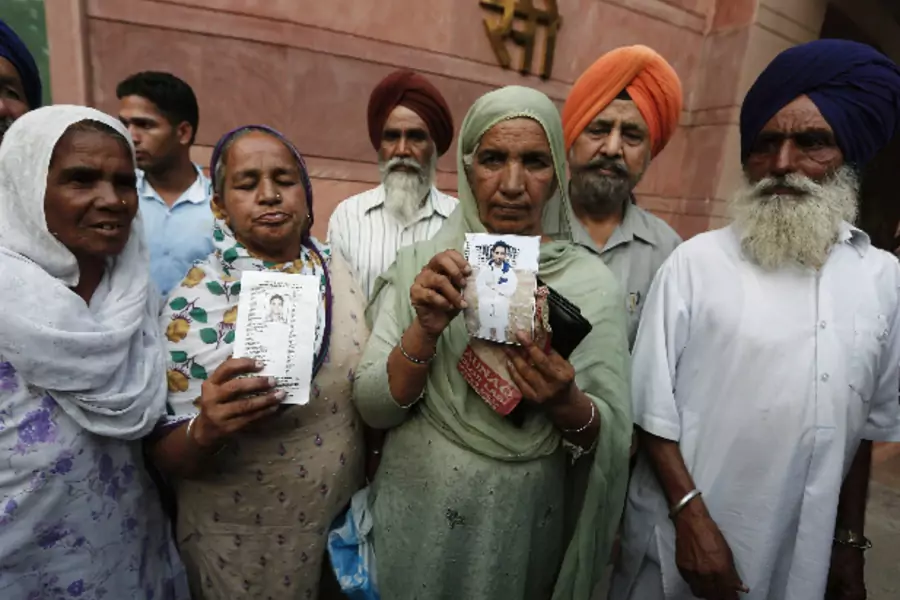Ashlyn Anderson: In Iraq, Modi Finds His First Foreign Policy Test

Ashlyn Anderson is a research associate for India, Pakistan, and South Asia at the Council on Foreign Relations.
The Islamic State of Iraq and Syria (ISIS) stunned the world with its recent victories over the Iraqi army, seizing large swaths of territory, including the cities of Fallujah, Tikrit, Mosul, Al-Qaim, and three other western Iraqi towns. But ISIS’s violence has affected countries well beyond Iraq’s borders, including India. With its large expatriate population in Iraq, unquenchable energy needs, and the threat of spillover into South Asia, India is grappling with its first foreign policy crisis.
More on:
ISIS’s violent campaign poses immediate threats to Indian citizens abroad. Forty Indian guest workers were kidnapped when ISIS forces took the city of Mosul. In Tikrit, forty-seven Indian nurses are stranded in a state-run hospital, abandoned by their employers. The Indian Ministry of External Affairs (MEA), led by Sushma Swaraj, geared up this weekend for rescue operations, dispatching two warships and Air India airplanes. A spokesman for the MEA announced, “departure of more than six hundred Indian nationals will be facilitated during the course of this week.”
In addition to the Indian citizens already affected, there are ten to fifteen thousand Indian expatriates in Iraq. If the situation deteriorates further, these workers could also find themselves caught in the crossfire. Moreover, with six to seven million Indian guest workers in the Middle East, diffusion of Sunni-Shia violence threatens to compromise the security of the guest workers and the wider Indian economy. As the top recipient country in the world for remittances--nearly half of which come from the Gulf countries--India has plenty at stake in the Middle East. Beyond remittances, it is also worth mentioning bilateral trade between India and Iraq, which crossed $20 billion last year.
Given India’s insatiable energy needs, a disruption in international oil prices would significantly affect the Indian economy. India is the fourth largest energy importer in the world, and oil makes up a quarter of India’s energy consumption with the majority of imports coming from the Middle East. Behind Saudi Arabia, Iraq is India’s largest crude oil supplier, providing 13 percent of India’s oil in 2013-14. Crude oil prices jumped amid concern over the outbreak of violence in Iraq, but declined last week along with the threat of oil disruption.
So far ISIS has not overtaken major oil refineries, but the risk remains. Because India subsidizes its oil imports, India’s current account deficit will take a hit with the rise in international oil prices despite strategic reserves, underlining the need for greater energy independence. Over the past couple of years, the need grew more urgent as India maneuvered to diversify its imports to comply with a post-Iran sanctions financial landscape--and now Iraq presents further challenges.
Not only does India need to diversify its country sources for energy, but also its energy mix; India remains heavily dependent on coal and crude oil and the current infrastructure supports the dependency. Prime Minister Modi highlighted energy reform as a major priority for the new Indian government if it is to succeed in reinvigorating the economy. Energy reform is a major undertaking that requires development of “infrastructure, human resource, and technology,” which President Mukherjee promised the government would deliver. The crisis in Iraq reinforces the necessity.
More on:
The worst case scenario for India would be the domino effect of ISIS spreading to South Asia. The success of ISIS has inspired international terrorist affiliates already, including those based in Pakistan; in fact members of al-Qaeda’s central command released a video calling upon Muslims of Kashmir to follow the example of their “brothers” in Syria and Iraq. Interestingly, a Shia cleric is leading Muslims in India to defend holy shrines in Iraq from Sunni militants; the sectarian divisions in Iraq have already roused feelings in South Asia.
Even if Iraq still seems like a distant crisis to some in India, it’s not inconceivable that India could face a similar situation right at its borders.With the presence of U.S. troops in Afghanistan shrinking, the potential for instability and resurgence of the Taliban looms in India’s backyard. Furthermore, jihadist groups harboring animosity for India will find it easier to refocus on their goals in Kashmir in the absence of international security forces.
Although reigniting the Indian economy is Modi’s top priority, in the coming years his effective stewardship of foreign policy will be crucial. India’s economic rise will require robust foreign policy strategy to protect its interests abroad. For now, the Indian government is shoulder-deep in finding and bringing home its citizens. Once they are safe, it is critical that India realizes what’s at stake in the Middle East and develops a plan to secure those interests.
 Online Store
Online Store